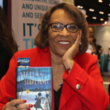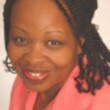Brown girl dreaming
Description
More Details
9780553397277
9780553397260
9780698195707
Subjects
African American women authors -- Biography -- Poetry
Authors, American -- 20th century -- Biography -- Juvenile poetry
Authors, American -- 20th century -- Biography -- Poetry
Biography & Autobiography
Children's audiobooks
Coretta Scott King winner
Juvenile Nonfiction
Sociology
Woodson, Jacqueline -- Juvenile poetry
Woodson, Jacqueline -- Poetry
Excerpt
Similar Titles From NoveList
Similar Authors From NoveList
Published Reviews
Booklist Review
*Starred Review* What is this book about? In an appended author's note, Woodson says it best: my past, my people, my memories, my story. The resulting memoir in verse is a marvel, as it turns deeply felt remembrances of Woodson's preadolescent life into art, through memories of her homes in Ohio, South Carolina, and, finally, New York City, and of her friends and family. Small things ice cream from the candy store, her grandfather's garden, fireflies in jelly jars become large as she recalls them and translates them into words. She gives context to her life as she writes about racial discrimination, the civil rights movement, and, later, Black Power. But her focus is always on her family. Her earliest years are spent in Ohio, but after her parents separate, her mother moves her children to South Carolina to live with Woodson's beloved grandparents, and then to New York City, a place, Woodson recalls, of gray rock, cold and treeless as a bad dream. But in time it, too, becomes home; she makes a best friend, Maria, and begins to dream of becoming a writer when she gets her first composition notebook and then discovers she has a talent for telling stories. Her mother cautions her not to write about her family, but, happily, many years later she has and the result is both elegant and eloquent, a haunting book about memory that is itself altogether memorable.--Cart, Michael Copyright 2014 Booklist
Publisher's Weekly Review
Written in verse, Woodson's collection of childhood memories provides insight into the Newbery Honor author's perspective of America, "a country caught/ between Black and White," during the turbulent 1960s. Jacqueline was born in Ohio, but spent much of her early years with her grandparents in South Carolina, where she learned about segregation and was made to follow the strict rules of Jehovah's Witnesses, her grandmother's religion. Wrapped in the cocoon of family love and appreciative of the beauty around her, Jacqueline experiences joy and the security of home. Her move to Brooklyn leads to additional freedoms, but also a sense of loss: "Who could love/ this place-where/ no pine trees grow, no porch swings move/ with the weight of/ your grandmother on them." The writer's passion for stories and storytelling permeates the memoir, explicitly addressed in her early attempts to write books and implicitly conveyed through her sharp images and poignant observations seen through the eyes of a child. Woodson's ability to listen and glean meaning from what she hears lead to an astute understanding of her surroundings, friends, and family. Ages 10-up. Agent: Charlotte Sheedy Literary Agency. (Aug.) (c) Copyright PWxyz, LLC. All rights reserved.
School Library Journal Review
Gr 4-7-Free verse is an effective writing style for describing dreams. Woodson's text is particularly compelling when detailing the small moments of life, such as the "Saturday night smells of biscuits and burning hair" or bemoaning the "hair ribbons that anchor (her) to childhood." And while poetry is sometimes difficult to follow on audio, this author is a masterful narrator. The sounds of the words and the rhythm expressed by her thoughtful intonation, careful pacing, and deliberate emphasis make clear the poetic form: "a country caught" (sharp c's and t, pause) "between black and white." Themes include the iconic search for identity in changing times: for example, Woodson's Southern cousins say she speaks too quickly, while in New York, "coming back home isn't really coming back home at all." Yet throughout her interestingly complicated childhood, young Jackie tells stories until she grows to understand that "stories are like air to me and I know now that words are.my brilliance." A personal memoir and a child's eye view of the nascent civil rights movement, this work confirms Woodson's brilliance as a writer for children and for adults, too.-Toby Rajput, National Louis University, Skokie, IL (c) Copyright 2014. Library Journals LLC, a wholly owned subsidiary of Media Source, Inc. No redistribution permitted.
Horn Book Review
In this memoir in verse, Woodson offers an intimate, immediate portrait of her unfolding childhood, haunted by specters of discrimination and cheered by the comfort of family. The author's own narration, with the resonance of a storyteller, is plainly conversational. Her easy cadence leaves phrases open, ready to accept the next line, establishing a comfortable, familiar rhythm perfectly suited to the natural verse. Never calling attention to itself, Woodson's honest reading, with nuanced pauses, inflections, and occasional whispers, invests the emotional impact in service to the poetry, where it belongs. The memoir is already receiving lots of attention, and this audio production offers another entry point into a compelling, transformative life story. thom barthelmess (c) Copyright 2014. The Horn Book, Inc., a wholly owned subsidiary of Media Source, Inc. No redistribution permitted.
Kirkus Book Review
A multiaward-winning author recalls her childhood and the joy of becoming a writer.Writing in free verse, Woodson starts with her 1963 birth in Ohio during the civil rights movement, when America is "a country caught / / between Black and White." But while evoking names such as Malcolm, Martin, James, Rosa and Ruby, her story is also one of family: her father's people in Ohio and her mother's people in South Carolina. Moving south to live with her maternal grandmother, she is in a world of sweet peas and collards, getting her hair straightened and avoiding segregated stores with her grandmother. As the writer inside slowly grows, she listens to family stories and fills her days and evenings as a Jehovah's Witness, activities that continue after a move to Brooklyn to reunite with her mother. The gift of a composition notebook, the experience of reading John Steptoe's Stevie and Langston Hughes' poetry, and seeing letters turn into words and words into thoughts all reinforce her conviction that "[W]ords are my brilliance." Woodson cherishes her memories and shares them with a graceful lyricism; her lovingly wrought vignettes of country and city streets will linger long after the page is turned.For every dreaming girl (and boy) with a pencil in hand (or keyboard) and a story to share. (Memoir/poetry. 8-12) Copyright Kirkus Reviews, used with permission.
Booklist Reviews
*Starred Review* What is this book about? In an appended author's note, Woodson says it best: "my past, my people, my memories, my story." The resulting memoir in verse is a marvel, as it turns deeply felt remembrances of Woodson's preadolescent life into art, through memories of her homes in Ohio, South Carolina, and, finally, New York City, and of her friends and family. Small things—ice cream from the candy store, her grandfather's garden, fireflies in jelly jars—become large as she recalls them and translates them into words. She gives context to her life as she writes about racial discrimination, the civil rights movement, and, later, Black Power. But her focus is always on her family. Her earliest years are spent in Ohio, but after her parents separate, her mother moves her children to South Carolina to live with Woodson's beloved grandparents, and then to New York City, a place, Woodson recalls, "of gray rock, cold and treeless as a bad dream." But in time it, too, becomes home; she makes a best friend, Maria, and begins to dream of becoming a writer when she gets her first composition notebook and then discovers she has a talent for telling stories. Her mother cautions her not to write about her family, but, happily, many years later she has—and the result is both elegant and eloquent, a haunting book about memory that is itself altogether memorable. Copyright 2014 Booklist Reviews.
Publishers Weekly Reviews
Written in verse, Woodson's collection of childhood memories provides insight into the Newbery Honor author's perspective of America, "a country caught/ between Black and White," during the turbulent 1960s. Jacqueline was born in Ohio, but spent much of her early years with her grandparents in South Carolina, where she learned about segregation and was made to follow the strict rules of Jehovah's Witnesses, her grandmother's religion. Wrapped in the cocoon of family love and appreciative of the beauty around her, Jacqueline experiences joy and the security of home. Her move to Brooklyn leads to additional freedoms, but also a sense of loss: "Who could love/ this place—where/ no pine trees grow, no porch swings move/ with the weight of/ your grandmother on them." The writer's passion for stories and storytelling permeates the memoir, explicitly addressed in her early attempts to write books and implicitly conveyed through her sharp images and poignant observations seen through the eyes of a child. Woodson's ability to listen and glean meaning from what she hears lead to an astute understanding of her surroundings, friends, and family. Ages 10–up. Agent: Charlotte Sheedy Literary Agency. (Aug.)
[Page ]. Copyright 2014 PWxyz LLCSchool Library Journal Reviews
Gr 4–7—"I am born in Ohio but the stories of South Carolina already run like rivers through my veins" writes Woodson as she begins her mesmerizing journey through her early years. She was born in Columbus, Ohio in 1963, "as the South explodes" into a war for civil rights and was raised in South Carolina and then New York. Her perspective on the volatile era in which she grew up is thoughtfully expressed in powerfully effective verse, (Martin Luther King is ready to march on Washington; Malcom X speaks about revolution; Rosa Parks refuses to give up her seat only seven years earlier and three years have passed since Ruby Bridges walks into an all-white school). She experienced firsthand the acute differences in how the "colored" were treated in the North and South. "After the night falls and it is safe for brown people to leave the South without getting stopped and sometimes beaten and always questioned; We board the Greyhound bus bound for Ohio." She related her difficulties with reading as a child and living in the shadow of her brilliant older sister, she never abandoned her dream of becoming a writer. With exquisite metaphorical verse Woodson weaves a patchwork of her life experience, from her supportive, loving maternal grandparents, her mother's insistence on good grammar, to the lifetime friend she meets in New York, that covers readers with a warmth and sensitivity no child should miss. This should be on every library shelf.—D. Maria LaRocco, Cuyahoga Public Library, Strongsville, OH
[Page 126]. (c) Copyright 2014. Library Journals LLC, a wholly owned subsidiary of Media Source, Inc. No redistribution permitted.






























